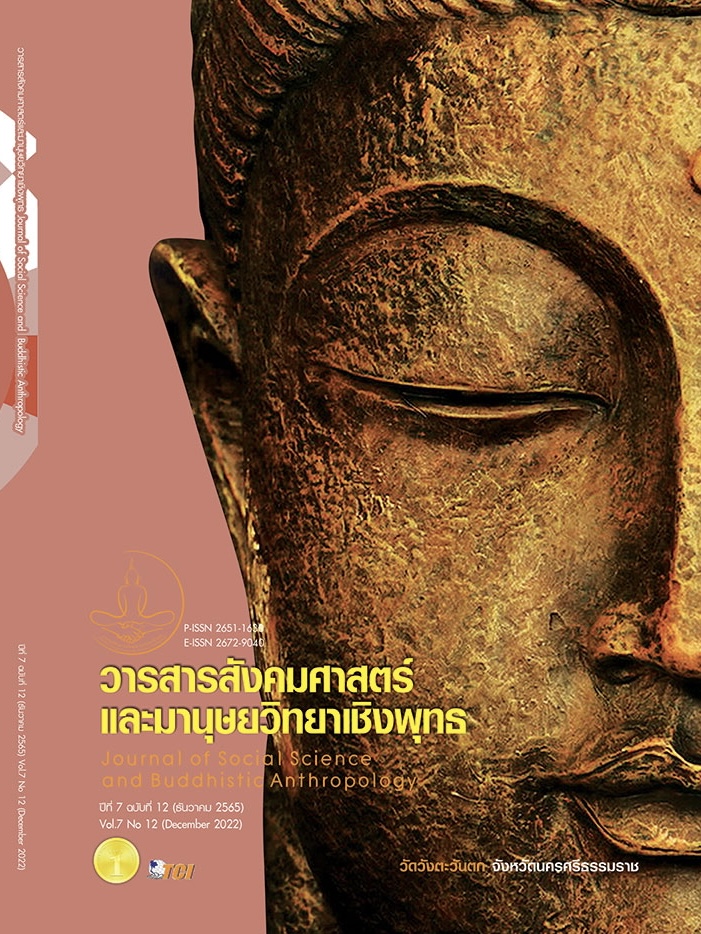THE ADMINISTRATIVE MODEL OF EDUCATIONAL SUFFICIENCY ECONOMY PHILOSOPHY LEARNING CENTER IN SECONDARY SCHOOL IN NORTHERN THAILAND
Keywords:
The Administrative Model, Sufficiency Economy, The Sufficiency Economy Philosophy Learning CenterAbstract
This research article aims to 1) study complements and the Guidelines for The Administrative Of Educational Sufficiency Economy Philosophy Learning Center In Secondary School In the North Part of Thailand 2) for creating and verifying the appropriateness the administrative model of educational sufficiency economy philosophy learning center in secondaryschool in northern Thailand. 3) assessment of the administrative model of educational sufficiency economy philosophy learning center in secondary school in northern Thailand on the possibilities and usefulness. The research were divided into three stages; the first stage is studying complements and guidelines for the development the administrative model of educational sufficiency economy philosophy learning center in secondary school in northern Thailand. The resources including documents, three schools with best practice and qualified persons interview. The tools used in this study were: documents synthetic form and interviewing form. Data analysis by content analysis. The second stage is creating and verifying the appropriateness of the development The Administrative Model and the group of informants consisted of experts by focus group discussion. The tools used in this study were group conversation recording form. Data analysis by content analysis. The third stage is the assessment of the administrative model of educational sufficiency economy philosophy learningcenter in secondary school in northern Thailand on the possibilities and usefulness from the sample with administration by 45 school administrators. The tools used in this study were questionnaires that checked the correctness. Data analysis by mean and standard deviation.The finding of this research found that the administrative model of educational sufficiency economy philosophy learning center in secondary school in northern Thailand consisted of 6 complements and success conditions; the first complement is the propose of the model, the second complement is the principle of the Model, the third complements is import factor of the model, the forth complements is the administrative process, the fifth complements is resultant and the last complements is the assessment guidelines and success conditions. And the results of the evaluation of the administrative model revealed that the possibility aspect is at a high level, and the usefulness is at the high level
References
คณะกรรมการจัดทำยุทธศาสตร์ชาติ สำนักเลขาธิการนายกรัฐมนตรี. (2560). การบรรยายเรื่องยุทธศาสตร์ชาติระยะ 20 ปี (พ.ศ.2560 - 2579). เรียกใช้เมื่อ 1 ธันวาคม 2560 จาก http://www.ldd.go.th/www/files/81731.pdf
คณะกรรมการดำเนินงานขับเคลื่อนสถานศึกษาพอเพียง กระทรวงศึกษาธิการ. (2562). เกณฑ์การประเมินศูนย์การเรียนรู้ตามหลักปรัชญาของเศรษฐกิจพอเพียงด้านการศึกษา. เรียกใช้เมื่อ 9 กุมภาพันธ์ 2021 จาก https://moe360.blog/
จันทรานี สงวนนาม. (2545). ทฤษฎีแนวปฏิบัติการบริหารสถานศึกษา. กรุงเทพมหานคร: บุ๊คพอยท์.
ปรัชญา พลพุฒินันท์. (2563). จัดการพอเพียง. เรียกใช้เมื่อ 30 มีนาคม 2563 จาก http://www.manager.co.th
ฤทัยรัตน์ ปัญญาสิม. (2560). การบริหารงานแบบมีส่วนร่วมที่ส่งผลต่อประสิทธิผลการบริหารสถานศึกษาสังกัดสำนักงานเขตพื้นที่การศึกษามัธยมศึกษา เขต 9. ใน ดุษฎีนิพนธ์ครุศา สตรมหาบัณฑิต สาขาการบริหารศึกษา. มหาวิทยาลัยราชนครปฐม.
วิจารณ์ พานิช. (2546). การจัดการความรู้ในยุคสังคมและเศรษฐกิจบนฐานความรู้. กรุงเทพมหานคร: สถาบัน ส่งเสริมการจัดการความรู้เพื่อสังคม.
ศาลินา บุญเกือ และนันทกาญจน์ ชินประหัษฐ์. (2557). บทสรุปรายงานวิจัยการถอดบทเรียนและวิเคราะห์อัตลักษณ์ศูนย์การเรียนรู้ตามหลักปรัชญาของเศรษฐกิจพอเพียงด้านการศึกษา. กรุงเทพมหานคร: ศูนย์สถานศึกษาพอเพียง มูลนิธิยุวสถิรคุณ.
ศูนย์สถานศึกษาพอเพียง มูลนิธิยุวสถิรคุณ. (2563). การขับเคลื่อนเครือข่ายสถานศึกษาพอเพียง. เรียกใช้เมื่อ 29 ธันวาคม 2563 จาก http://www.sufficiencyeconomy. org/eduplan/
สํานักงานคณะกรรมการพิเศษเพื่อประสานงานโครงการอันเนื่องมาจากพระราชดําริ. (2562). สรุปภาพรวมข้อมูลโครงการอันเนื่องมาจากพระราชดำริ. เรียกใช้เมื่อ 29 ธันวาคม 2563 จาก http://www.rdpb.go.th/
สำนักงานคณะกรรมการพัฒนาเศรษฐกิจและสังคมแห่งชาติ. (2550). ชีวิตพอเพียง. กรุงเทพมหานคร: ดอกเบี้ย.
เสริมศักดิ์ วิศาลาภรณ์. (2541). การกระจายอำนาจการบริหารและการจัดการศึกษา:ศึกษากรณีการจัดการตั้งมหาวิทยาลัยนครพนม. ใน สารนิพนธ์รัฐประศาสนศาตรมหาบัรฑิต สาขาวิชานโยบายสาธาณรณะ. มหาวิทยาลัยศรีนครินทรวโรฒ.
White, A. T. (1982). Why Community Participation? A Discussion of theArguments. Community Participation: Current Issue and Lesson Learned. New York: United Nations Chil.
Downloads
Published
How to Cite
Issue
Section
License

This work is licensed under a Creative Commons Attribution-NonCommercial-NoDerivatives 4.0 International License.









